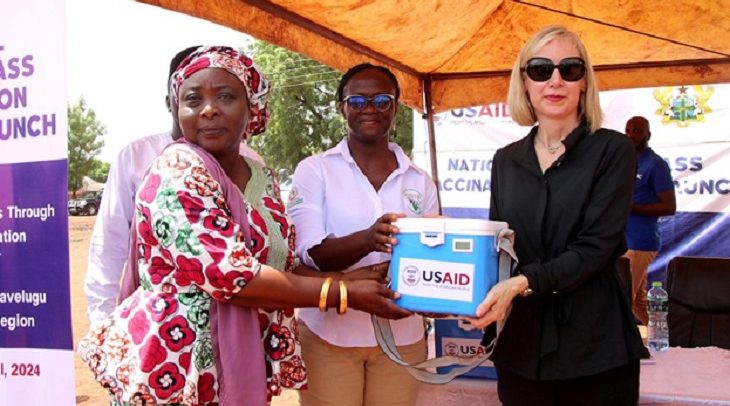Kimberly Rosen presenting sample of the Anthrax Vaccine to Hajia Hawa Musah
The government has received 100,000 doses of Anthrax vaccine from the United States government, through the United State Agency for International Development (USAID).
The donation forms part of USAID’s support for the government and United Nations Food and Agriculture Organization (FAO) Anthrax Vaccination Campaign.
The anthrax vaccination campaign is expected to cover about one million animals across the five regions of the North.
In May 2023, Ghana experienced an outbreak of anthrax, affecting six districts in the Upper East Region. A total of 97 animals died from the outbreak. Thirteen suspected human anthrax cases were also detected, with one death recorded.
The Vaccine Production Unit of the Central Veterinary Laboratory in Pong-Tamale produced the vaccine.
At the launch of the Campaign at Kpallaung in the Savelugu Municipality, USAID/Ghana Mission Director, Kimberly Rosen, noted that livestock like cattle, sheep, and goats, have a high risk of transmission to humans and should be prioritized for vaccination and that anthrax does not only threaten human life but also, economic prosperity and food security.
She indicated that USAID is partnering with the FAO to provide technical support for the vaccination campaign and monitor its rollout across northern Ghana.
Ms. Rosen stated that USAID is investing in the joint external evaluation of Ghana’s international health regulations capacity noting that the important periodic assessment will tell how prepared the country is for major public health emergencies, and what precautions to take.
The USAID/Ghana Mission Director urged the government and other development partners to sustain their support to make the campaign and future campaigns a success.
“We must strengthen our prevention and response systems to protect our human, environmental, and animal health. Let us continue to work together to invest in global health security and combat the spread of infectious diseases for a safer and healthier Ghana,” she said.
In the past year, USAID provided approximately $105 million to Ghana’s health sector for global health security, nutrition, and social protection, maternal, newborn, and child health.
Effective preventive and response outbreak activities require a close collaboration between multiple sectors and government agencies, including the Ministry of Food and Agriculture’s Veterinary Services, the Ghana Health Service, the Ministry of Interior, the Ministry of Local Government and the National Disaster Management Organization.
Dr. Benita Anderson, who spoke on behalf of the Chief Veterinary officer, Dr. Emmanuel Cudjoe, said the launch of the anthrax vaccination campaign marks a significant milestone in ongoing efforts to safeguard the health and well-being of the nation’s livestock and communities.
“Through the implementation of this anthrax vaccination campaign, we are taking proactive steps to protect our livestock and prevent the spread of this devastating disease. Each vaccine administered represents a shield of protection, a barrier against the ravages of anthrax,” he added.
Dr. Anderson, however, revealed that the success of the campaign relies not only on the vaccines which will be distributed but also on the collective effort and dedication of every individual.
“Together, let us forge ahead with determination, resilience, and unity. Let us prioritize the health and well-being of our livestock, our farmers, and our nation as we strive to build a future free from the threat of anthrax,” he said.
Northern Regional Director of Agriculture, Hajia Hawa Musah, appealed to farmers in the five regions to ensure that they fully participate in the vaccination exercise.
“When the vets announce the vaccination dates kindly come out in your numbers with your animals for them to be vaccinated,” he said.
BY Eric Kombat, Kpallaung


